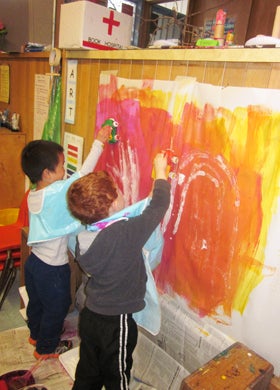The Child Development Centers play an integral role in many student, faculty and community academic experiences as the lab school for URI’s department of Human Development and Family Studies. There are a variety of different ways that students, faculty, and other members of the community have experiences at the Child Development Centers.

These experiences include:
- Student Assistants in the CDC Classrooms
- Practicum Courses in the HDF major
- Research Involving Children at the CDC
- Observation Assignments Within HDF and Other Departments
- Course-based Single Interaction Assignments
Student Assistants in the CDC Classrooms
The Directors of the Child Development Centers hire approximately 15 undergraduate students each semester to serve as assistants in the Kingston and Providence CDC classrooms. These assistants are primarily students with a college work study award through student financial aid or students in the early childhood certification program and work approximately 8-20 hours a week. For more information about this opportunity, in Kingston contact Jessica MacLeod at jldavis@uri.edu and in Providence contact Delia Hall at delia@uri.edu.
Submit an application
Senior Interns in the CDC Classrooms
The URI Child Development Centers are seeking HDF Senior Interns interested in positions working directly with young children in high-quality preschool classroom settings. A limited number of positions are available for motivated students each semester.
Submit an application
Practicum Courses in the HDF Major
The Child Development Centers are actively involved in the delivery of academic content for two courses in the HDF curriculum, Introduction to Work with Young Children (HDF 308) and Early Childhood Curriculum I (EDC 301). Students enrolled in these courses have extensive involvement at the CDC through a weekly practical experience.
- HDF 308: Introduction to Working With Young Children
Students in HDF 308 spend 3 hours per week for 12 weeks of the semester in the role of a teacher aide. For many of these students it is their first experience working directly with children and thus expectations for these students include interacting with the children appropriately, assisting the teacher in daily tasks, becoming familiar with developmentally appropriate practices, and learning positive guidance techniques. Each semester there are between 25-50 of these students in the classrooms on a weekly basis.
The CDC teachers provide weekly supervision and mentoring of these students and conduct extensive midterm and final evaluations. These evaluations comprise approximately one quarter of the students’ course grade. The CDC teachers and director visit the academic classroom once during the semester to meet with the students about issues related to their experience at the CDC. - EDC 301: Early Childhood Curriculum I
Students enrolled in EDC 301 spend three hours per week for 12 weeks of the semester working with one group of children at one of the CDCs. The majority of these students are working towards early childhood teacher certification and plan a career working with young children. The expectations for these students include planning integrated activities and leading group times, assessing children, and refining their skills of interacting and guiding young children. All of this occurs under the direct guidance and supervision of the CDC teachers.
The CDC teachers engage in extensive weekly supervision of the EDC 301 students: providing feedback on interactions and integrated activity plans, engaging in supportive supervision and prompting self-reflection, completing midterm and final evaluations, and providing ongoing modeling and mentoring in the classroom. Students’ final practicum grade comprises one quarter of their grade for the course. The CDC teachers visit the academic classroom during the semester to meet with the practicum students and engage in discussion regarding their experience at the CDC.
Research Involving Children at the CDC
The Child Development Centers are actively involved with faculty and students from across the university in the generation of new knowledge and the development of innovative educational practices. The CDC is an excellent resource for the study of the child in the context of the family and the community.
Research projects may involve the development of research instruments, master’s theses, pilot efforts leading to outside funding, and full scale studies.
Potential investigations may focus on a range of topics related to the social, emotional, physical, and cognitive development of young children; the creation and management of early education environments; relationships between teachers and children, teachers and parents, and parents and children.
Observation Assignments Within HDF and Other Departments
The Child Development Centers serve as an observation site for courses in the HDF department as well as for courses from several departments across campus. These Child Development Center observations coincide with the content being taught in the academic classrooms. Additionally, high school child development classes from throughout Rhode Island utilize the CDC for observation experiences. Most of the time these observations occur one time a semester and the students have a specific assignment to target their observations
Course-based Single Interaction Assignments
The CDCs can serve in the capacity of a one-time lab setting for courses in fields related to early childhood education and child development. In these instances, faculty members from HDF or other departments request that the students enrolled in their class have an experience at the Child Development Centers directly interacting with children. Because of the unique expertise of the CDC directors and teachers, their intimate knowledge of the enrolled children, and the trust families have placed in them to maintain the integrity of their child’s CDC experience, these requests are carefully reviewed.
